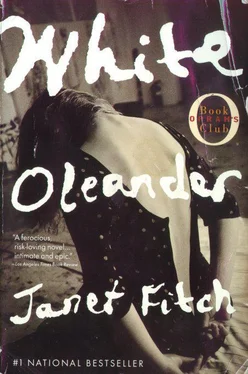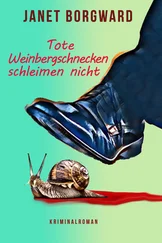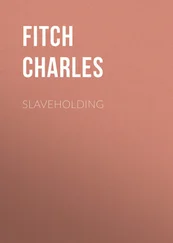Janet Fitch - White Oleander
Здесь есть возможность читать онлайн «Janet Fitch - White Oleander» весь текст электронной книги совершенно бесплатно (целиком полную версию без сокращений). В некоторых случаях можно слушать аудио, скачать через торрент в формате fb2 и присутствует краткое содержание. Жанр: Современная проза, на английском языке. Описание произведения, (предисловие) а так же отзывы посетителей доступны на портале библиотеки ЛибКат.
- Название:White Oleander
- Автор:
- Жанр:
- Год:неизвестен
- ISBN:нет данных
- Рейтинг книги:3 / 5. Голосов: 1
-
Избранное:Добавить в избранное
- Отзывы:
-
Ваша оценка:
- 60
- 1
- 2
- 3
- 4
- 5
White Oleander: краткое содержание, описание и аннотация
Предлагаем к чтению аннотацию, описание, краткое содержание или предисловие (зависит от того, что написал сам автор книги «White Oleander»). Если вы не нашли необходимую информацию о книге — напишите в комментариях, мы постараемся отыскать её.
White Oleander — читать онлайн бесплатно полную книгу (весь текст) целиком
Ниже представлен текст книги, разбитый по страницам. Система сохранения места последней прочитанной страницы, позволяет с удобством читать онлайн бесплатно книгу «White Oleander», без необходимости каждый раз заново искать на чём Вы остановились. Поставьте закладку, и сможете в любой момент перейти на страницу, на которой закончили чтение.
Интервал:
Закладка:
“This woman gave you alcohol?”
“No. Marvel and Ed had a big Christmas Eve party last night. The eggnog was spiked.” The sparkle of my sapphire, Officer Moody. See how it shimmers. Nothing up my sleeve. “They make you work on Christmas?”
“Triple overtime,” he said. “I’ve got child support you wouldn’t believe. So what did you do next door?”
“Listened to records, talked.”
“And you spent the night?”
“Well, it was too noisy to sleep over here.”
He pulled his fleshy earlobe. “You go over there a lot?”
I shrugged. “She’s nice, but she’s busy. She travels a lot.”
“She ever introduce you to her friends?”
I shook my head, let my mouth go slack, a little moronic, as if I had no idea what he was getting at. You mean, did she ever set me up on a date with one of her Johns? Did she ever sell me to the BMW man on a cake platter like Pretty Lady? I wanted to laugh in his face.
“She ever talk to you about what she does for a living?” He said it quietly, stroking his brushy mustache.
“She’s a caterer, I think.” It came out of nowhere.
“What a bunch of crap!” Marvel called out from where she was talking to the other cop, her eyes narrowed in disgust.
I turned my back to the turquoise house so Marvel couldn’t read my lips. “Marvel hates her because she’s pretty and doesn’t have any kids to worry about. She’s always calling her names—nigger, whore. It’s embarrassing, but what am I supposed to do, I’m just a foster kid. She does it to all the neighbors, ask anybody. Beaner this, Jew bitch that, everybody hates her.” He probably said nigger and leaner too, this Officer Moody, pulling his red ear-lobes, but not where anybody would write it up.
They sent me inside, but I watched through the kitchen window as the Schutzstaffel went through Olivia’s garden, knocked at her door. Five minutes later, they were back. I could hear Marvel screaming. “Aren’t you going to arrest her?”
The patrol car slowly pulled away from the curb without Olivia Johnstone.
THINGS WENT back to normal for the rest of the Christmas break, except Marvel watched me like a shoplifter. No more “runs” to the market or library, no more “workouts.” But she mostly stopped yelling at me, and was back to just telling me what to do and otherwise treating me like a slave. She left me alone to babysit on New Year’s Eve, though she called four times to make sure I was there. I left messages on Olivia’s machine, but she never picked up.
15
ON THE FIRST DAY back at school after winter break, I was given a yellow summons slip during third period. It led to a sour, overweight caseworker waiting in the office with the girls’ vice principal. The vice principal told me to clear my locker out and leave my books at the front desk. She never once looked at my face. The new caseworker said she had my things in the car.
I twirled my combination and emptied the books from my locker. I was stunned, and somehow not. How like Marvel to do this while I was at school, without a word of warning. I was there and then I wasn’t. I would never see any of them again, would never have the chance to tell Olivia good-bye.
The caseworker, Ms. Cardoza, scolded me all the way back into town, down the Ventura Freeway. “Mrs. Turlock told me everything. That you was doing drugs, running around. With little kids in the house. I’m taking you somewhere you’ll learn to act right.” She was an ugly young woman with a broad, rough-skinned face and a set look about the jowls. I didn’t bother to argue with her. I would never speak to anyone ever again.
I thought of the lies Marvel would tell the kids, why I didn’t come home. That I died, or ran off. But no, that wasn’t Marvel, the Hallmark card woman, dyeing her hair behind closed doors. She would think up something completely the opposite, something you could paint on a Franklin Mint plate. That I went to live with my grandma on a farm, where we had ponies and ate ice cream all day.
Though it hurt me to admit it, I realized Olivia would probably be relieved. She’d miss me a little, but it wasn’t her style to miss anyone much. Too many gold badges knocking on her door. She would rather worship sweaters. I wrapped my arms around my waist and slumped against the door. If I had had more energy I would have opened the car door and fallen out under the sixteen-wheeler driving next to us.
THE NEW HOME was in Hollywood, a big wooden Craftsman with a deep eaved porch, too nice for foster care. I wondered what the story was. Ms. Cardoza was excited, she kept opening and closing her handbag. A Latina girl with a long braid let us in, eyed me guardedly. Inside it was dark, the windows covered with heavy curtains. The woodwork gleamed halfway up the walls, smelling of lemon oil.
In a moment, the foster mother appeared, chic and straight-backed, with a dramatic streak in her dark hair. She shook hands with us, and Ms. Cardoza’s eyes shone as she took in Amelia’s fitted suit and high heels. “¿Que pasa con su cam?” the foster mother asked. What happened to my face. The social worker shrugged.
Amelia invited us to sit in the living room. It was beautiful, carved wood and claw-footed chairs, white damask and needlepoint. She served tea from a silver set, and butter cookies on flowered bone china. I put to work all I had learned at Olivia’s, showing her how I could hold my cup and saucer and keep the spoon from falling. They spoke Spanish while I looked into the deodar cedar framing the bay window. It was quiet, no TV. I could hear the little clock on the mantel.
“It’s beautiful, no? Not a dormitory,” Amelia Ramos said with a smile. She sat on the edge of her chair, her legs crossed at the ankle. “This is my home, and I hope you will enjoy becoming part of our life.”
Every once in a while a girl would pass by, cast an inscrutable glance through the doorway, as Amelia signed the papers and explained the rules in her lightly accented English. Each girl cooked and cleaned up one night a week. I would make my bed, shower every other day. The girls took turns doing the laundry and other chores. She was an interior decorator, she explained. She needed the girls to look after themselves. I nodded each time she paused, wondering why she took in girls at all. Maybe the house was too big for her, made her lonely.
OVER THE POLISHED dining table, the other girls spoke in Spanish to each other, laughing in lowered voices, and only stared at me. I was the White Girl. I had been here before, there was nothing you could do about it. Amelia introduced them. Kiki, Lina, Silvana. The girl with the long braid was Micaela, and the wiry, tough-looking girl with a crescent-moon scar on her forehead serving the meal was Nidia Diaz. We ate chiles rellenos, with a salad and corn bread.
“It’s good,” I said, hoping Nidia would stop glaring at me.
“I provide the recipes,” Amelia said. “Some of these girls come to me, they cannot even open a can.” She eyed Nidia and smiled.
Afterward, we took our plates into the kitchen, where Nidia was starting on the dishes. She took my plate and narrowed her eyes at me, but said nothing.
“Come in here, Astrid,” Amelia called. She brought me into the sitting room, more feminine than the living room, with lace-edged tabletops and an old-fashioned couch. She had me sit in the armchair next to hers. She opened a large leather-bound album on the marble-topped coffee table. “This is my home. In Argentina. I had a splendid house there.” There were photos of a pink house with a flagstone courtyard, a dinner party with candlelit tables set up around a rectangular pool. “I could seat two hundred for dinner,” she said.
In the dark interior of the house were a heavy staircase, dark paintings of saints. In one photograph, Amelia in pearls sat in a thronelike chair before a painting of herself, she wore a ribbon diagonally across her ball gown, and flanking her chair were a man, also with ribbons, and a beautiful little boy. “This is my son, Cesar, and my husband.”
Читать дальшеИнтервал:
Закладка:
Похожие книги на «White Oleander»
Представляем Вашему вниманию похожие книги на «White Oleander» списком для выбора. Мы отобрали схожую по названию и смыслу литературу в надежде предоставить читателям больше вариантов отыскать новые, интересные, ещё непрочитанные произведения.
Обсуждение, отзывы о книге «White Oleander» и просто собственные мнения читателей. Оставьте ваши комментарии, напишите, что Вы думаете о произведении, его смысле или главных героях. Укажите что конкретно понравилось, а что нет, и почему Вы так считаете.












